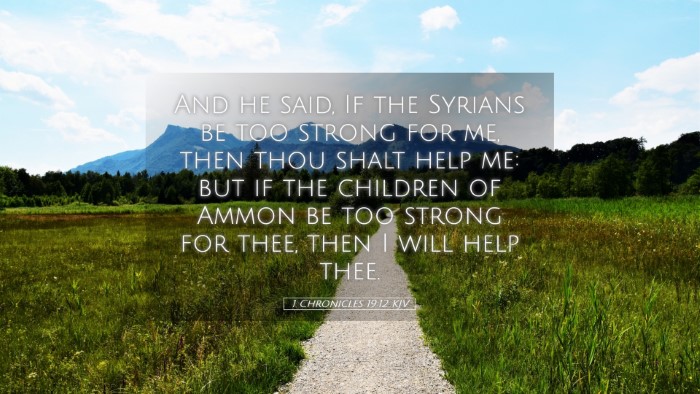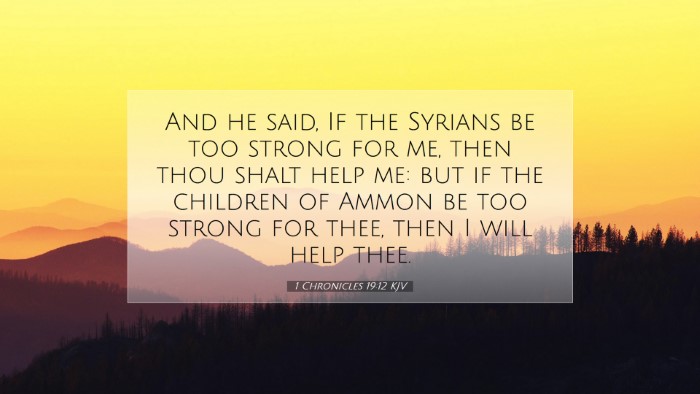Commentary on 1 Chronicles 19:12
Verse Context: 1 Chronicles 19:12 states, "And if the people of Ammon be too strong for me, then thou shalt help me: but if the children of Ammon be too strong for thee, then I will come and help thee." This verse reflects the strategic alliance between David and his military leaders in the face of adversity from the Ammonites.
Background and Historical Context
The historical backdrop of 1 Chronicles is vital for understanding the implications of the text. During this period, David had established his kingdom and faced numerous external threats, particularly from neighboring nations like Ammon. This specific conflict arose after the death of Nahash, king of the Ammonites, leading to diplomatic tensions. David had sought to show kindness to Hanun, Nahash's son, but this was met with suspicion.
The Alliance and Mutual Support
This verse emphasizes the theme of mutual support and partnership in the face of challenges. David communicates a sense of camaraderie and shared responsibility among his military leaders.
- Mutual trust: David’s call for help reveals his reliance on his commanders. It underlines the necessity for leaders to collaborate during times of crisis.
- Shared burden: The acknowledgment that both parties may face strength in their enemies highlights the reality of fluctuating fortunes in warfare.
- Strategic alliances: This appeal for assistance underscores the importance of alliances in ancient warfare, applicable to present spiritual and community partnerships.
Theological Reflections
The verse offers profound theological insights regarding leadership and community within the body of believers. Drawing from public domain commentaries:
- Matthew Henry: Notes that the cooperation between David and his commanders reflects the unity essential within the body of Christ. Just as David relies on his men, believers in the church should support and lift each other, especially in difficult times.
- Albert Barnes: Comments on the nature of interdependence among leaders. Each leader carries their own burdens, but the strength derived from fellowship can overcome greater challenges. This verse serves as a reminder of the collective nature of spiritual battles.
- Adam Clarke: Emphasizes that the expression of willingness to assist one another shows not only humility but the calling to serve others. In church life, this translates to serving the lost and edifying the brethren in faith.
Practical Applications
The counsel found in 1 Chronicles 19:12 serves as a practical guide for modern pastors, students, and theologians today.
- Encourage collaboration: Church leaders should actively foster teamwork and shared missions within their congregations.
- Promote support systems: Establish formal and informal networks for community support in the face of life’s challenges.
- Strengthen unity: The Church should embody a spirit of unity, remembering that the battle is often communal rather than individual.
Conclusion
1 Chronicles 19:12 is a microcosm of broader biblical themes of solidarity, leadership, and mutual support. The insights drawn from public domain commentaries portray the significance of unity, not just in military engagements, but in the spiritual warfare waged by modern believers. A commitment to supporting one another enhances the strength of the body of Christ, ensuring that when one is weak, the others can stand firm.


